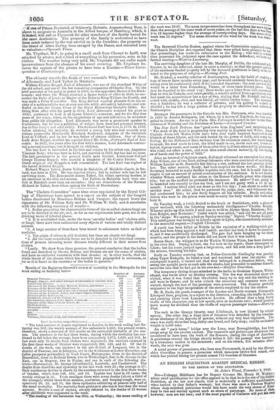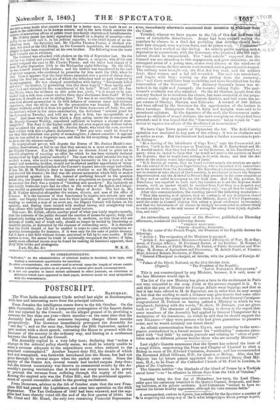AN ENGLISH INQUISITION AGAINST MEDICAL FERESY.
TO TILE EDITOR OF THE SPECTATOR.
St. John's Wood, November 1;1849.
Ste—Unhappy Middlesex has for Deputy Coroner Mr. Henry M. WakleY whose chief qualification for the office appears to be that be is the son of his father. Doubtless, as the law now stands, that is technically a sufficient qualification, when backed by that father's warrant; but there was once a Thomas Weide), whose deep-mouthed patriotism would fain have made the very stones of Fires- bury to rise and mutiny against such an abuse of patronage. No more of that, however: men are but men; and if the most popular of Coroners will put his own to, into a snug berth that should be filled by a better man, the fault is not so reaeb in the individual as in human nature, and in the laws which sanction the eastern of converting offices of public trust into family chattels and hereditaments. Wakley junior has lately signalized himself by a display of amazing—stu- pidity let us mildly call it, in his judicial capacity, to the cruel injury of an nn- Offending man. On Saturday last, Mr. Charles Thomas Pearce, a medical stu- dent, was tried at the Old Bailey, on the Coroner's inquisition, for manslaughter alleged to have been committed on his own brother. The following were the main (setae rought out in evidence. Th deceased was attacked with cholera on the 8th of September last. On the 9th he was visited and prescribed for by Mr. Harris, a surgeon; who of his own accord resigned the case to Mr. Charles Pearce; and the latter had charge of it seem Msnday September 10th to the Wednesday night following. On the 13th, he was himself seized with cholera ; and his brother was transferred to the care of another surgeon, who continued to prescribe for him until the 18th, when he died. Thus it appears that the fatal illness extended over a period of eleven days; daring the first two and last six of which the defendant took no part whatever in its management. He was charged nevertheless with having " leloniously killed and slain' his brother, by preventing him (for three days!) " from having suffi- cient Dad and victuals for the nourishment of his body." What ! said Mr. Jus- tice Shute, when the evidence on this point was given, " is it meant to be con- tended that a sick man cannot survive three days' abstinence from food ? If that were true, I should not now be sitting here." Yet was it on something surpassing even that absurd assumption in its wild defiance of common sense and common experience, that the whole case for the prosecution was founded. Mr. Charles Pearce withheld solid food from his patient for three days—not all food; for, said his brother's widow in her cross-examination, the defendant " ordered gruel for the deceased on Tuesday, and told me to give it him, two tea-spoonfuls at a time." And these were the facts which a Jury, acting under the instructions of Mr. Deputy Coroner Wakley, considered sufficient to warrant a charge of man- slaughter! The Jury in the higher court did not even require any defence before they acquitted the accused; and Mr. Justice Maule, who tried the case, received their verdict with this emphatic declaration: " How any man could be found to say that this defendant was guilty of manslaughter, I cannot conceive: it appears that he was called in a desperate case, and that he did everything it was possible to do under the circumstances." No unprejudiced person will dispute the fitness of Mr. Justice Maule's con- cluding observations, or fail to see that they amount to a most severe censure on the Deputy Coroner. Has Mr. Wakley junior no discreet friend to point out to him the propriety of vacating an office for which he has been virtually declared incompetent by high judicial authority? The man who could mistake his way in so clear a case, who could so wantonly outrage humanity in the person of a be- reaved and mourning brother, should not be allowed another opportunity of bring- ing the time-honoured institutionof the Coroner's inquest into contempt and odium. It was Mr. H. M. Wakley's duty to inquire whether or not Mr. Charles Pearce had starved his brother ; for that was the utmost accusation which folly or malice had preferred against him. But, instead of confining himself to the question before him, the Deputy Coroner rushed into a disquisition on homoeopathy, which he assured the Jury was a system of "humbug and quackery." His rigmarole on this totally irrelevant topic had its effect in the return of the foolish and iniqui- tous verdict so pointedly condemned by the Judge of Assize. The fact is, Mr. H. M. Wakley mistakes altogether the nature, objects, and uses of the office of Coroner. It is the business of that functionary to inquire into certain acts and deeds: our Deputy Coroner tries men for their opinions. If positive evidence be wanting to convict a man of an overt act, the Deputy Coroner will fasten on his opinions, and, finding them tainted with medical heresy, will straightway visit that offence with bodily incarceration and moral torture. This case, Mr. Editor, affords another proof of what you lately urged—namely, that the interests of the public demand the creation of means for openly, fully, and impartially testing novel facts and doctrines in medicine, so that those who are desirous of truth, and of truth only, should no longer be misled by blundering or deceitful guides, or distracted by the clamour of contending sects. It is desirable that the world should at last be enabled to come to some settled conclusion re- specting honaceopathy for instance, if it were only for the sake of public decency. Let it have a fair field without favour, and stand or fall by its own merits. If the system is true, the sooner its truth is universally recognized the better; if false, surely more effectual means may be found for making its falsehood apparent, than dirty little tricks and stratagems.



























 Previous page
Previous page